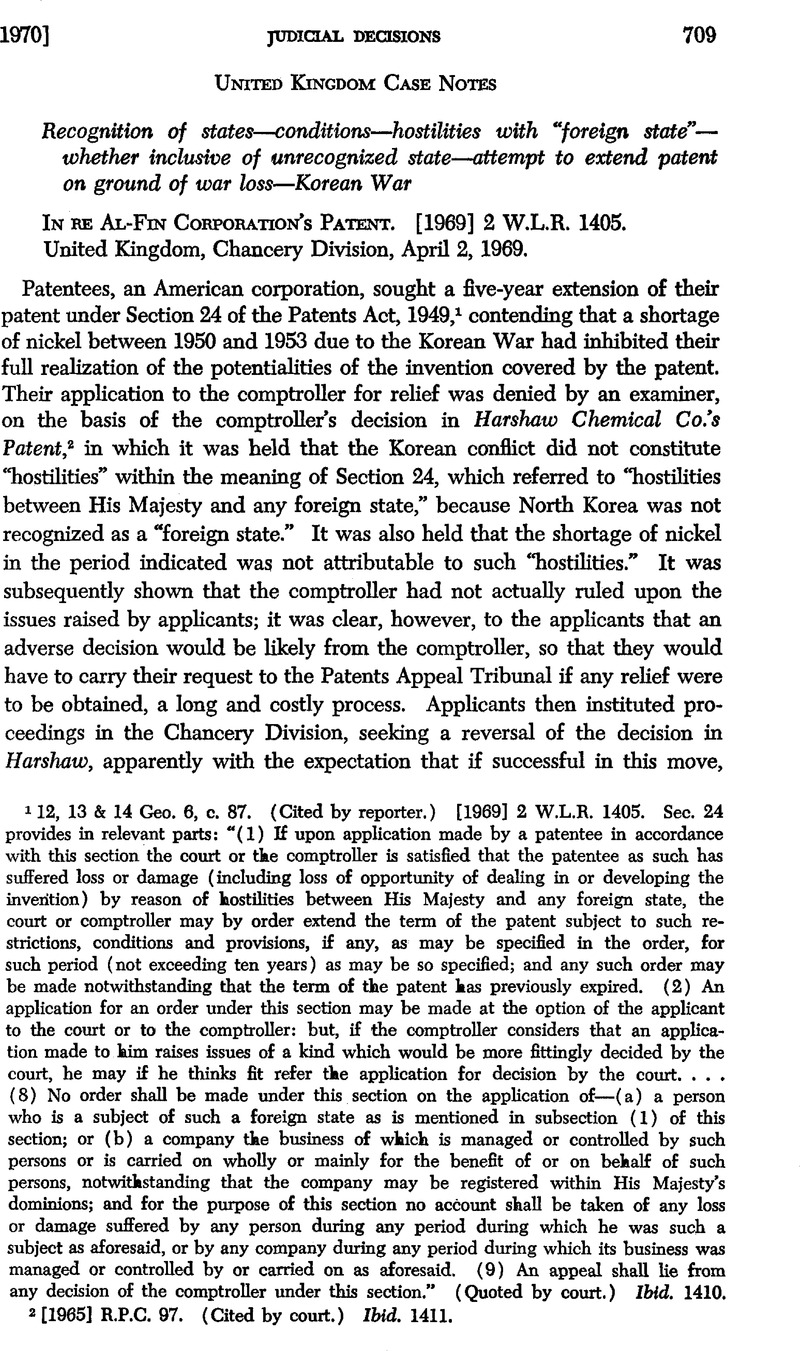No CrossRef data available.
Article contents
United Kingdom Case Notes
Published online by Cambridge University Press: 28 March 2017
Abstract

- Type
- Judicial Decisions
- Information
- Copyright
- Copyright © American Society of International Law 1970
References
1 12, 13 & 14 Geo. 6, c. 87. (Cited by reporter.) [1969] 2 W.L.R. 1405. Sec. 24 provides in relevant parts: “(1) If upon application made by a patentee in accordance with this section the court or the comptroller is satisfied that the patentee as such has suffered loss or damage (including loss of opportunity of dealing in or developing the invention) by reason of hostilities between His Majesty and any foreign state, the court or comptroller may by order extend the term of the patent subject to such restrictions, conditions and provisions, if any, as may be specified in the order, for such period (not exceeding ten years) as may be so specified; and any such order may be made notwithstanding that the term of the patent has previously expired. (2) An application for an order under this section may be made at the option of the applicant to the court or to the comptroller: but, if the comptroller considers that an application made to him raises issues of a kind which would be more fittingly decided by the court, he may if he thinks fit refer the application for decision by the court… . (8) No order shall be made under this section on the application of—(a) a person who is a subject of such a foreign state as is mentioned in subsection (1) of this section; or (b) a company the business of which is managed or controlled by such persons or is carried on wholly or mainly for the benefit of or on behalf of such persons, notwithstanding that the company may be registered within His Majesty's dominions; and for the purpose of this section no account shall be taken of any loss or damage suffered by any person during any period during which he was such a subject as aforesaid, or by any company during any period during which its business was managed or controlled by or carried on as aforesaid. (9) An appeal shall he from any decision of the comptroller under this section.” (Quoted by court.) Ibid. 1410.
2 [1965] R.P.C. 97. (Cited by court.) Ibid. 1411.
3 The Certificate, dated July 8, 1968, provided in par. 4: “So far as the existence of authorities is concerned, this is considered to be a question of fact but Her Majesty's Government are aware that between June 25, 1950 and July 27, 1953, there were certain authorities styling themselves The Government of the Democratic people's Republic of Korea’ exercising control over the above-mentioned area [i.e. the area of Korea above the 38th parallel].” Ibid. 1408.
4 The affidavit contained a factual account of the nature of the government of North Korea and the beginning of hostilities in June, 1950. Ibid. 1408-1409. persons who, being accused or convicted of any of the crimes or offences enumerated in Article 3, committed within the jurisdiction of the one Party, shall be found within the territory of the other Party.“
3 Art. 7 provides: “A person surrendered can in no case be kept in custody or be brought to trial in the territories of the High Contracting Party to whom the surrender has been made for any other crime or offence, or on account of any other matters, than those for which the extradition shall have taken place, until he has been restored, or has had an opportunity of returning, to the territories of the High Contracting Party by whom he has been surrendered. “This stipulation does not apply to crimes or offences committed after the extradition.“
4 [1969] 3 W.L.R. 1074 at 1090.
5 33 & 34 Vict. c. 52.
6 [1969] 3 W.L.R. 1074 at 1091-1092, distinguishing Connelly v. Director of Public Prosecutions, [1964] A.C. 1254 H.L.(E.).
7 15 & 16 Geo. 6 & 1 Eliz, 2 c. 55 (cited by reporter). [1969] 3 W.L.R. 1074 at 1075. Sec. 87(1) of this Act provides: “Any person who was a party to any proceeding before a magistrates’ court or is aggrieved by the conviction, order, determination or other proceeding of the court may question the proceeding on the ground that it is wrong in law or is in excess of jurisdiction by applying to the justices composing the court to state a case for the opinion of the High Court on the question of law or jurisdiction involved.” (Quoted by Lord Reid.) Ibid. 1093.
8 Ibid. 1101.


